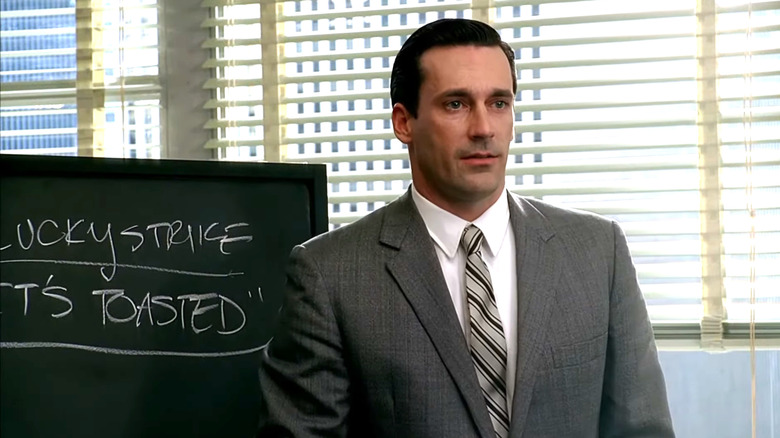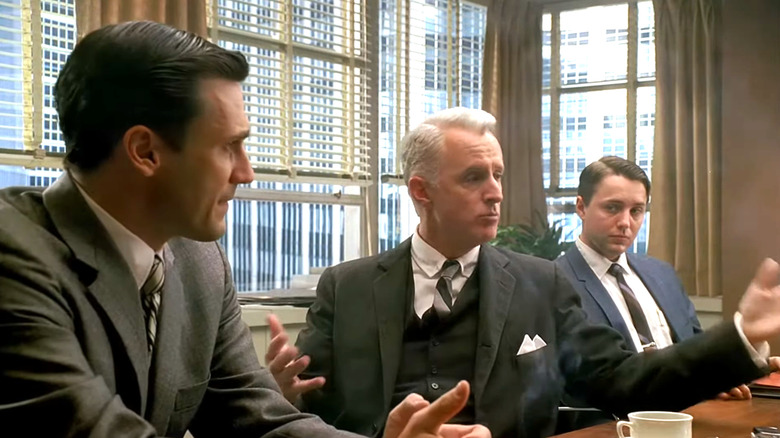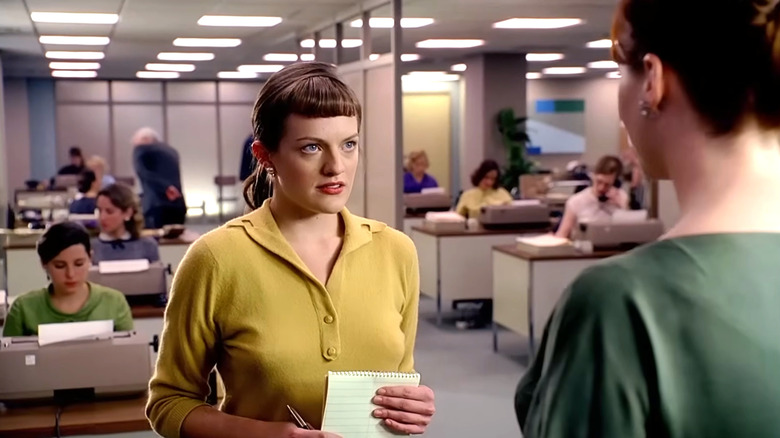Why Mad Men Season 1 Is The Lowest-Rated On IMDb
"Mad Men" is known today as a consistently strong TV show, a highlight of the supposed golden era of television, but its reputation wasn't always so stellar. The show was more controversial than many remember in its first season, and that's reflected in the IMDb ratings. As one fan helpfully pointed out, seasons 1 and 2 have the lowest average ratings of the show, and season 1 specifically has the lowest-rated episode: "Ladies Room," the first episode after the pilot.
To be clear, an average episode rating of 8.3 is still impressive, and a lowest-ever rating of 7.5 isn't too shabby either. But why is season 1 in particular rated so low? That first season is what put AMC on the map, paving the way for "Breaking Bad" a year later and "The Walking Dead" two years after that. How could such a ratings hit also be the critical low point of the series?
Part of this is likely a filtering effect. Viewers who didn't jibe with the series likely stopped watching after the first few episodes and subsequently stopped rating them. It's also possible that some viewers needed time to really click with the show. I had a similar experience watching "The Office," unable to properly appreciate the show's flavor of cringe comedy until early season 2, and finding I like the first season a lot more on rewatch.
But those explanations can apply to any show; for "Mad Men" specifically, part of the problem might be that season 1 is genuinely the worst season. It's leagues better than most TV shows, sure, but season 1 is a mere taste of what the show has in store.
Season 1 is 'Mad Men' at its most unsubtle
"Mad Men" is a show with a lot to say about the time period it's portraying, but season 1 gets too obvious with it. The casual bigotry is over-the-top in that first season, especially the first episode. Don's delivery of "I won't let a woman talk to me like this" is not only painfully unlikable, but it feels out of character for him in hindsight. Don may hold many of the expected prejudices of his time, but he wouldn't be this clumsy about it.
The pilot is also infamous among "Mad Men" fans for the characterization of Sal (Bryan Batt), who is written as way too obviously gay for a man who is supposedly trying to stay in the closet. For the rest of the show, it's believable that Sal has kept his sexuality a secret for so long, but here it seems impossible that no one else has figured him out yet. The writers even give him the trite moment where he guiltily says, "So we're supposed to believe that people are all living one way and secretly thinking the exact opposite? That's ridiculous." It's hard not to roll your eyes at this scene.
Most damning of all is the way season 1 often feels like it's sneering at the '60s, with moments that seem to have no other purpose but to say, "Man, isn't it crazy how backwards this time was?" There's a scene in the pilot where the ad men are talking to people from the cigarette company they represent; they dismiss the idea that cigarettes are bad for you, and then they each descend into a coughing fit. It's ham-fisted commentary, the sort of thing "Mad Men" quickly grew out of.
If you don't like season 1, keep watching anyway
The overly conservative nature of season 1 has a purpose beyond the social commentary. Season 1 hammers home the regressive parts of its time period as a way to help establish its characters — especially its female characters like Betty, Joan, Peggy — as natural underdogs. It also underlines how transformative a period the '60s were in the United States. By taking us from the late '50s vibe of season 1 to the early '70s vibe of season 7, "Mad Men" captures Don's feeling of the world changing too much, too fast.
But while the glaring sexism on display in season 1 makes the eventual flourishing of the show's female characters extra satisfying down the line, it still leaves us with the ad men acting like jerks nearly 24/7 and the female characters having to quietly put up with it. It's easy to dismiss the viewers who falsely assumed the "Mad Men" writers held the sexist views of many of its characters, but it's also easy to understand why some viewers don't have the stomach for it. Even if you understand the bigotry in "Mad Men" season 1 is being portrayed critically, it can be tough to sit through, especially with Peggy so early in her arc.
Still, it can't be stressed enough how much "Mad Men" evolves from this point. Not only does it grow more subtle and nuanced, but it builds on its own history in a way that few other shows manage to pull off. Every character evolves in fun, surprising ways; Joan especially goes from somewhat one-note in season 1 to arguably the show's best character by season 5. More so than any other show of its time, "Mad Men" rewards its viewers for sticking around.


